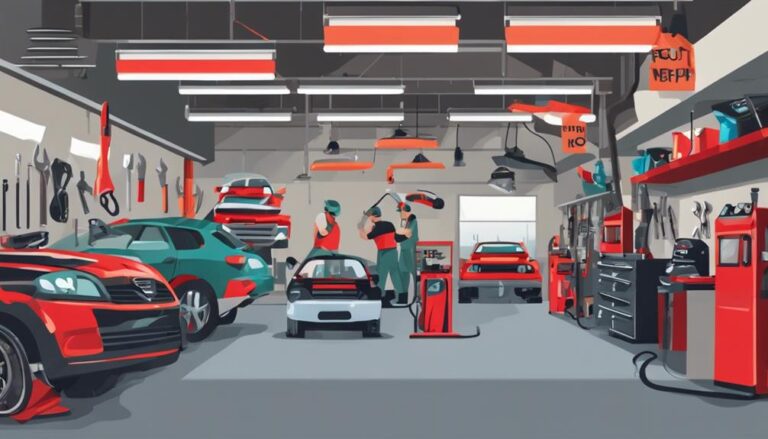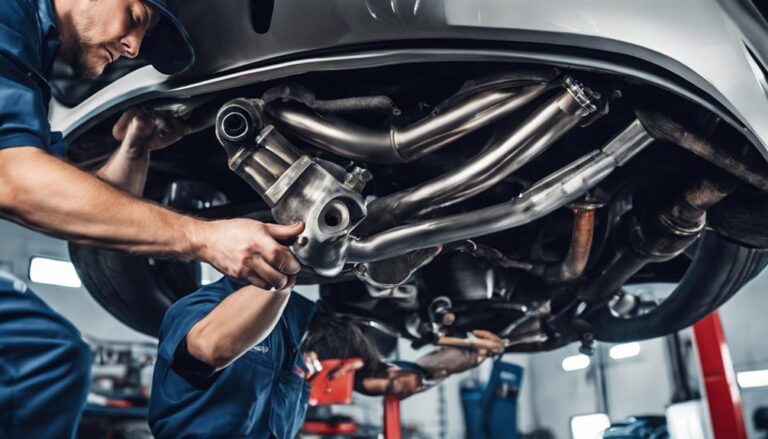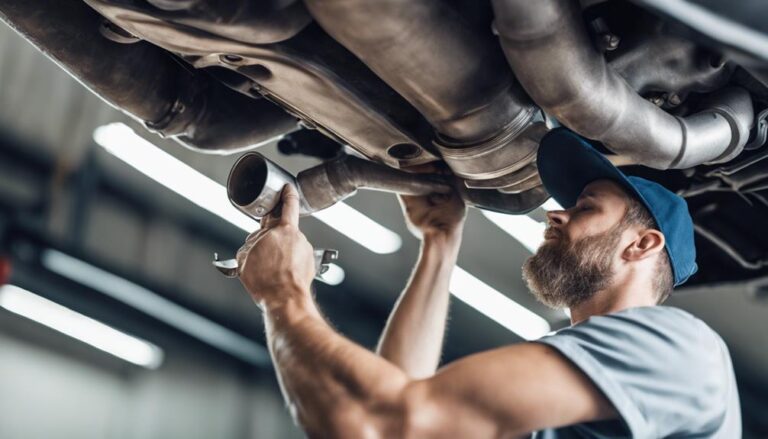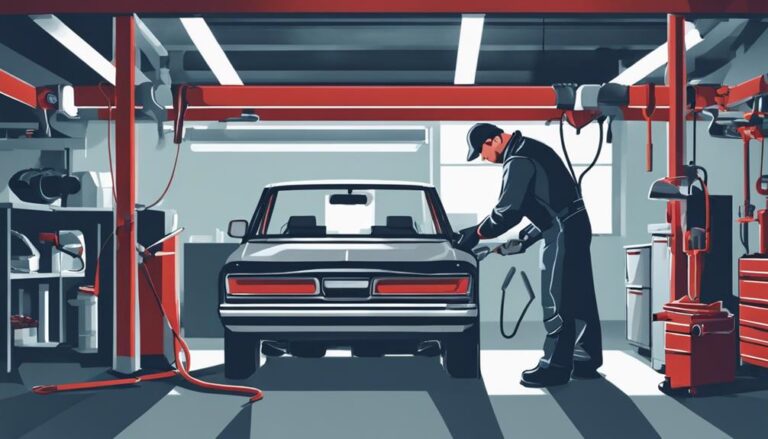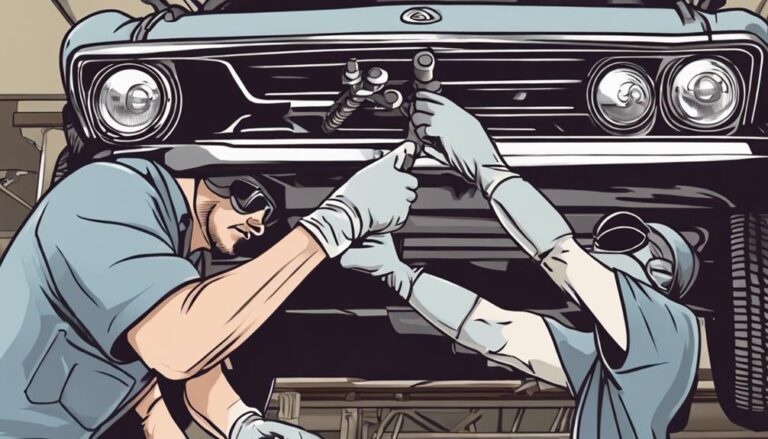Identifying Common Signs of a Failing Exhaust System
When it comes to your vehicle's well-being, paying attention to the warning signs can save you from costly repairs down the road. Imagine cruising down the road, and suddenly, you hear a loud rumbling under your car. What could that be? Well, it might just be the first hint of a failing exhaust system.
But what other signs should you be on the lookout for? Stay tuned to discover the subtle indicators that could help you catch exhaust system issues before they escalate.
Key Takeaways
- Unusual engine noises like rumbling or hissing indicate possible exhaust system faults.
- Abnormal smells, such as a strong exhaust odor or rotten-egg scent, signal issues.
- Visible signs like rust on pipes or exhaust leaks require immediate attention.
- Prompt action through maintenance, addressing warning lights, and diagnostics is crucial for optimal performance.
Unusual Engine Noises
Experiencing unusual engine noises, such as deep rumbling or hissing, could indicate potential exhaust system issues that require immediate attention to prevent further damage. These sounds may point to exhaust leaks, muffler problems, or other underlying issues that need diagnosing solutions. To ensure your vehicle's optimal performance and safety, engaging in preventative maintenance is crucial. Ignoring these warning signs can lead to more severe exhaust system faults, resulting in costly repairs down the line. By promptly addressing any strange noises emanating from the engine, you can mitigate potential risks and maintain your vehicle's health.
One way to tackle these concerns is by regularly inspecting your exhaust system for leaks, rust, or damage. Additionally, ensuring that all components are securely fastened can help prevent issues before they escalate. If you notice any unusual noises, it's advisable to consult a professional mechanic for a thorough examination and timely repairs. Remember, proactive maintenance is key to preserving the longevity and efficiency of your vehicle's exhaust system.
Decreased Performance
When your vehicle's exhaust system begins to exhibit signs of decreased performance, it could be a result of exhaust leaks causing strain on the engine. This strain can manifest in various ways affecting your vehicle's overall performance. Here are some key points to consider:
- Performance issues: Exhaust leaks can lead to decreased engine power and efficiency, impacting your vehicle's ability to reach optimal speeds and accelerations.
- Maintenance tips: Regularly inspecting your exhaust system for leaks or blockages can help prevent performance issues. Additionally, timely repairs and maintenance can ensure your exhaust system functions optimally.
Addressing exhaust system failures promptly is crucial to maintaining your vehicle's performance and fuel efficiency. By staying proactive and addressing any performance issues promptly, you can ensure that your vehicle operates smoothly and efficiently. Regular maintenance and tuning of your exhaust system can go a long way in enhancing your vehicle's overall performance.
Abnormal Smells

If you detect a strong exhaust smell inside your vehicle, it may signal a potential issue with the catalytic converter or an exhaust leak. The distinct rotten-egg scent in exhaust emissions is often associated with a malfunctioning catalytic converter. A properly functioning catalytic converter works to convert sulfur in the exhaust into odorless sulfur dioxide, effectively eliminating the unpleasant smell. When exhaust gases containing sulfur aren't adequately processed, they can lead to the foul odor permeating your vehicle's interior.
To address abnormal smells emanating from your exhaust system, consider conducting diagnostic tests to pinpoint the exact cause. A mechanic can perform tests to identify if the catalytic converter is failing or if there's an exhaust leak contributing to the issue. Regular maintenance of your exhaust system, including timely repairs and replacement of faulty components, can help prevent these odors from occurring. By staying proactive with maintenance, you can ensure your exhaust system functions optimally and keeps harmful emissions at bay.
Visible Exhaust Leaks
Detecting visible exhaust leaks is crucial for ensuring the safety of your vehicle and preventing the release of harmful gases into the cabin. When inspecting your exhaust system for leaks, pay close attention to the following:
- Spotting rust: Rust on your exhaust pipes can indicate areas where leaks may be present. Rust weakens the metal, making it prone to developing holes and cracks where exhaust gases can escape.
- Inspecting welds: Check the weld points along the exhaust system for signs of damage or separation. Poorly welded areas can lead to leaks, compromising the efficiency of the exhaust system.
- Looking for holes or damage: Examine the entire length of the exhaust pipes for holes, punctures, or other visible damage. Even small openings can result in significant leaks that pose a danger to both you and your passengers.
Regularly inspecting your exhaust system for these visual cues can help you catch leaks early, ensuring your vehicle operates safely and efficiently.
Warning Lights

One common indicator of potential issues with your vehicle's exhaust system is the illumination of the check engine light. When this warning light comes on, it's crucial to address it promptly as it can signify various problems, including issues within the exhaust system. Ignoring the check engine light can lead to more severe damage and potential hazards, highlighting the importance of immediate attention.
To effectively manage warning lights related to your exhaust system, consider some maintenance tips. Regularly checking your vehicle's diagnostic codes can provide insight into the specific issue triggering the light. Utilizing diagnostic tools can help pinpoint the root cause of the problem, allowing for targeted repairs and preventing further complications.
Frequently Asked Questions
How Can You Tell if Your Exhaust System Is Bad?
If your exhaust system is bad, you can tell by noticing exhaust leaks and strange noises. These issues may indicate serious problems that require immediate attention. Don't ignore signs of a failing exhaust system for your safety and vehicle's performance.
What Is One of the Most Obvious Signs of a Problem With Your Exhaust System?
When your exhaust system falters, listen for loud noises and watch for the smell of fumes. Feel the performance dip and fuel efficiency drop. These signs scream for attention, indicating potential issues that need fixing.
What Is the Most Common Cause of Failure on the Exhaust System?
Corrosion stands as the main culprit behind exhaust system failures. It weakens pipes, leading to leaks. This can impact engine performance and increase noise levels. Regular checks can help you catch corrosion early and avoid costly repairs down the road.
How Do I Know if My Car Exhaust Needs Replacing?
Feeling unsure about your car exhaust? Listen for odd sounds, check for rust, and be wary of smells. Don't overlook vibrations or changes in performance. Regular maintenance can save you from costly repairs down the road.
Conclusion
As you navigate the road of vehicle maintenance, remember that identifying common signs of a failing exhaust system is like being the vigilant guardian of your car's health.
By listening to the engine's whispers, feeling its vibrations, and detecting any unusual scents, you can uncover the hidden secrets of a potential exhaust system failure.
Stay alert, take action swiftly, and let your vehicle breathe freely once more. Your car will thank you with smooth purrs of gratitude.


